RCMP Practice Questions -- Taking the RCMP Entrance Test? We can help!
Are you preparing for the RCMP’s online assessment and want to walk in feeling confident and ready? The RCMP online assessment (sometimes called RPAT / RPAB) is a critical step in the RCMP recruitment process — it tests your cognitive abilities, memory, spatial reasoning, verbal skills, and workstyle preferences. But here’s the good news: you don’t have to go in unprepared.
With our RCMP Practice Test & Study Guide, (or online course) you’ll experience mock exams that mirror the real test, complete with detailed explanations for every answer, and proven strategies to tackle each section under time pressure. Use our resource to simulate test day, hone your weak spots, and build the confidence to perform at your best. Whether you’re doing your first practice or repeating to push your score higher, this guide is your all-in-one tool to ensure you’re not surprised — but instead, ready to earn your place on that eligibility list.
The RCMP is Hiring!
From the Official Website:
The RCMP is seeking motivated team players who are strong communicators, enjoy working with diverse communities, are physically fit and possess strong leadership abilities. All applicants must reflect the core values of the RCMP. These include integrity, honesty, professionalism, compassion, respect and accountability.
The RCMP offers an exceptional career, letting you make a real difference in local communities and on the national and international stage. No other police force in Canada provides the levels of services and variety offered by the RCMP, as well as opportunities for continued learning and growth. Visit the Official RCMP Website for more information
Read more at the Gazette for more on policing and the RCMP. (official newsletter)
Eligibility
- Be a Canadian citizen or have permanent resident status in Canada. Individuals with permanent resident status must have resided (been physically present) in Canada for 3 (1,095 days) out of the last 5 years as a permanent resident.
- Be at least 18 years of age to apply.
- Be proficient in English and/or French.
- Possess a valid driver’s license
- Possess a Canadian secondary school (high school) diploma or equivalent
- Meet the health and psychological standards
- Meet the vision standards
- Meet the hearing standards
- Meet the necessary level of physical abilities
- Be prepared and able to carry a firearm and to use it or any other essential physical force
- Be willing to spend 26 weeks at the RCMP’s training academy (Depot) in Regina, Saskatchewan
- Be ready to relocate anywhere within Canada
- Be willing to work shift work including weekends and holidays
- Be aware of requirements for tattoos, jewelry, and other personal effects
Practice Questions
Reading Comprehnsion
For example, they may need to read and analyze complex legal documents to determine the validity of a search or arrest warrant, or to understand the nuances of a specific law or regulation. They may also need to read and interpret witness statements and police reports to gather evidence and build a case.
Types of reading questions that generally appear on the exam.
- Drawing logical conclusions
- Make predictions
- Analyze and evaluate the use of text structure to solve problems or identify sequences
- Vocabulary – Give the definition of a word from context
- Summarize
Recommended Reading Comprehension Practice
Composition
Writing skills are important for RCMP officers because they write detailed reports, memos, emails, and other forms of written communication on a regular basis. These documents are critical to documenting evidence, communicating with other officers and agencies, and building cases for criminal investigations.
Clear and concise writing is especially important for RCMP officers because their reports and documents may be used in court as evidence. Poorly written reports can lead to confusion and misunderstandings, which can negatively effect the outcome of a case.
This section tests your ability to articulate in writing, complex thoughts in a clear and concise way that is understandable to others.
This includes, vocabulary, spelling and English grammar.
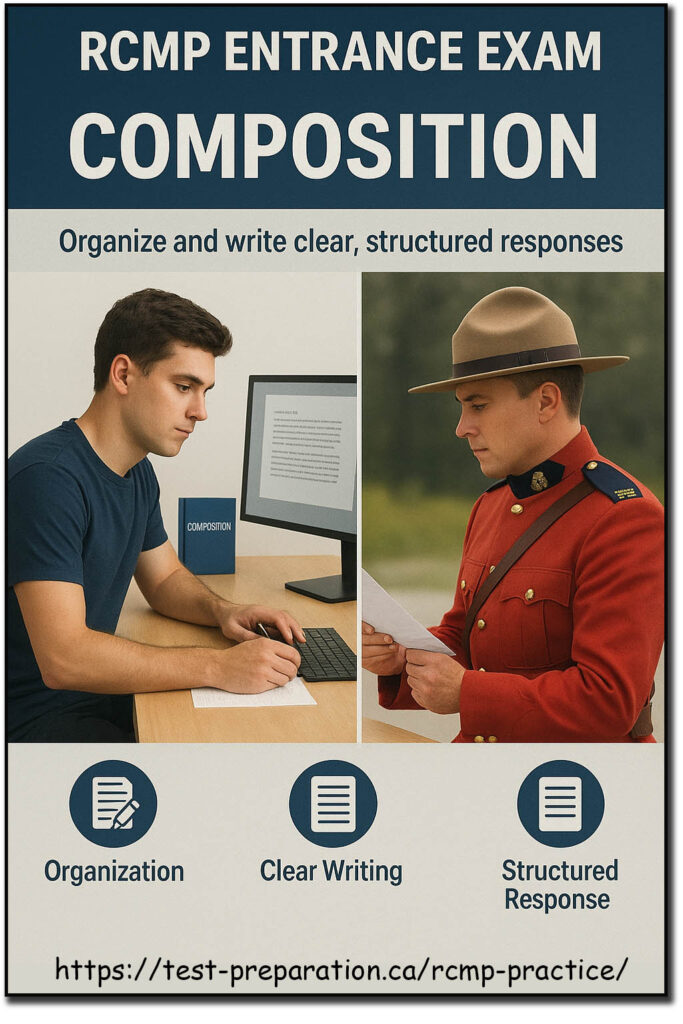
Complete Test Prep & Practice – PDF Download
PDF Download Version of Print Version. Download after purchase.
Study Practice Online Course
Full Study Practice Online Course with tutorials, self assessments, quizzes, timed tests and more!
Paperback Version
Complete RCMP Entrance Test Paperback (Amazon)
Spatial Ability (Visual Acuity)
The Spacial Ability section has three types of questions, all of which are graphical. One you are given a shape and you must choose what shape is possible if folded, or looped and joined. Another type is you are given a shape and you must choose the same shape rotated. Another type is you are given a 2-dimensional shape and asked to find same shape when folded into a 3-dimensional shape.
Recommended Spatial Ability Practice
Logic and Problem Solving
Logic and problem solving skills are important skills for RCMP officers because they often encounter complex situations that require quick thinking and decision-making. They may need to gather and analyze information from multiple sources, identify patterns and trends, and make logical deductions in order to solve a problem or make an informed decision.
For example, when responding to a crime scene, RCMP officers must quickly assess the situation and make decisions. They need logical thinking and problem-solving skills to identify potential risks, threats, gather evidence, interview witnesses, and make other decisions quickly and accurately.
Logic and problem-solving skills are important for investigating crimes and gathering evidence. RCMP officers may need to use deductive reasoning and analytical thinking to identify suspects, piece together evidence, and build a case.
Questions likely to appear on the test:
- Ordering information in a logical sequence
- Map reading
- Solving problems
- Identifying patterns in data
Basic Math
RCMP officers use basic math frequently in their everyday duties. For example, they may need to calculate distances, speeds, and times when responding to emergencies or pursuing suspects. They may also need to use math to estimate the value of stolen property, determine the amount of drugs involved in a case.
RCMP officers may need to use basic math to complete paperwork and reports, for example, accurately record the time and date of events, calculate overtime, or record money seized during an investigation.
Basic math skills are also important. RCMP officers may use math to analyzing data and identifying trends, for example, analyzing crime statistics, identifying patterns, and developing strategies to preventing crime in their community.
Questions include:
- Fractions
- Decimals
- Percent
- Order of Operations
- Word Problems
Recommended Basic Math Practice
Complete Test Prep & Practice – PDF Download
PDF Download Version of Print Version. Download after purchase.
Study Practice Online Course
Full Study Practice Online Course with tutorials, self assessments, quizzes, timed tests and more!
Paperback Version
Complete RCMP Entrance Test Paperback (Amazon)
Memory and Recall
RCMP officers need to recall important details, procedures, and laws quickly and accurately, for example recalling information from training or previous experiences to effectively respond to a situation.
For example, when responding to an emergency, an RCMP officer must remember the appropriate protocols and procedures to follow to ensure their safety and the safety of others. They need to recall their training and apply it in a high-stress situation.
Memory and recall are important for investigating crimes. RCMP officers must remember details from witness statements, crime scenes, and other sources to build a case against a suspect.
In this section you are given a list of people or cars, which you may review for 5 minutes, then answer comprehension questions. Another format is a short passage which describes an incident, which again you may study for 5 minutes, then answer comprehension questions.
Recommended Memory & Recall Practice
Professional Judgement
Answering professional judgment questions involves common sense and following a set of basic criteria.
- General Situation Judgment: Develop your ability to assess various situations swiftly and accurately, ensuring you make the right decisions under pressure.
- Safety First: Learn best practices for prioritizing personal and public safety in every scenario, empowering you to act decisively and confidently.
- Protecting Property: Understand the nuances of property protection, including recognizing threats and implementing preventive measures to safeguard community assets.
- Calming Disorder: Master techniques for diffusing tense situations and restoring order, ensuring a peaceful resolution while minimizing risk to all involved.
- Conflict Resolution: Enhance your conflict resolution skills with strategies to manage disputes effectively, promoting understanding and cooperation.
- Keeping the Peace: Discover proactive approaches to maintaining community tranquility and preventing escalation of tensions through strategic interventions.
- Enforcing the Law: Gain insight into lawful enforcement practices that uphold community standards while respecting individual rights.
- Ethical Decision Making: Strengthen your ethical framework with case studies and scenarios that challenge your moral compass, fostering integrity in every decision.
- Teamwork: Emphasize the importance of collaboration in law enforcement, learning how to effectively communicate and coordinate with colleagues to achieve common goals.
Recommended Professional Judgement Test
Complete Test Prep & Practice – PDF Download
PDF Download Version of Print Version. Download after purchase.
Study Practice Online Course
Full Study Practice Online Course with tutorials, self assessments, quizzes, timed tests and more!
Paperback Version
Complete RCMP Entrance Test Paperback (Amazon)
Date Published: Monday, May 25th, 2015
Date Modified: Monday, October 13th, 2025

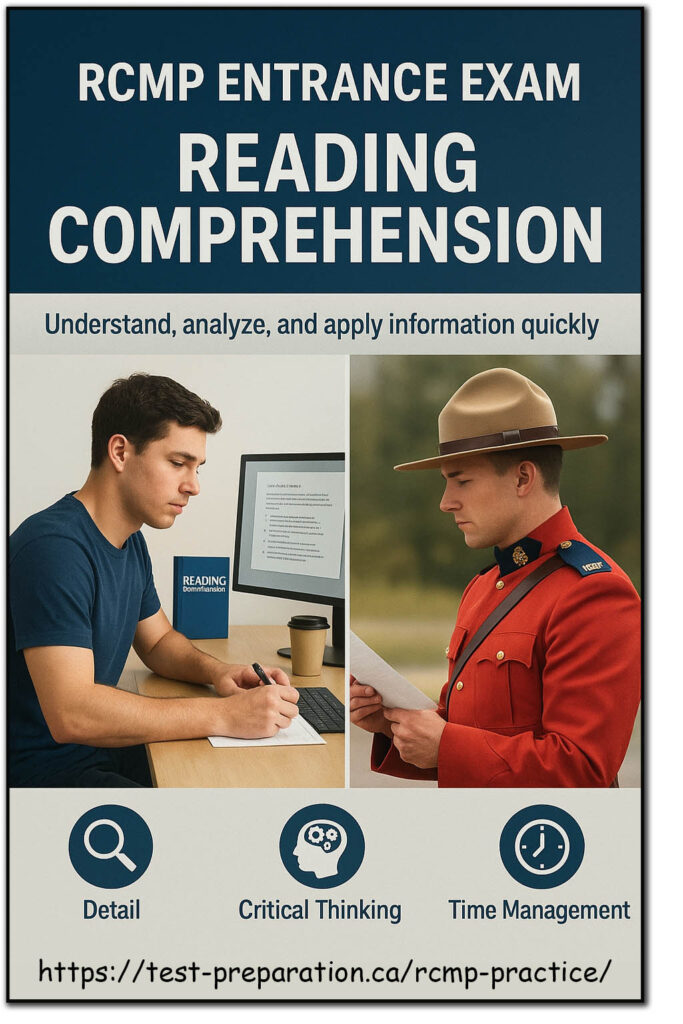
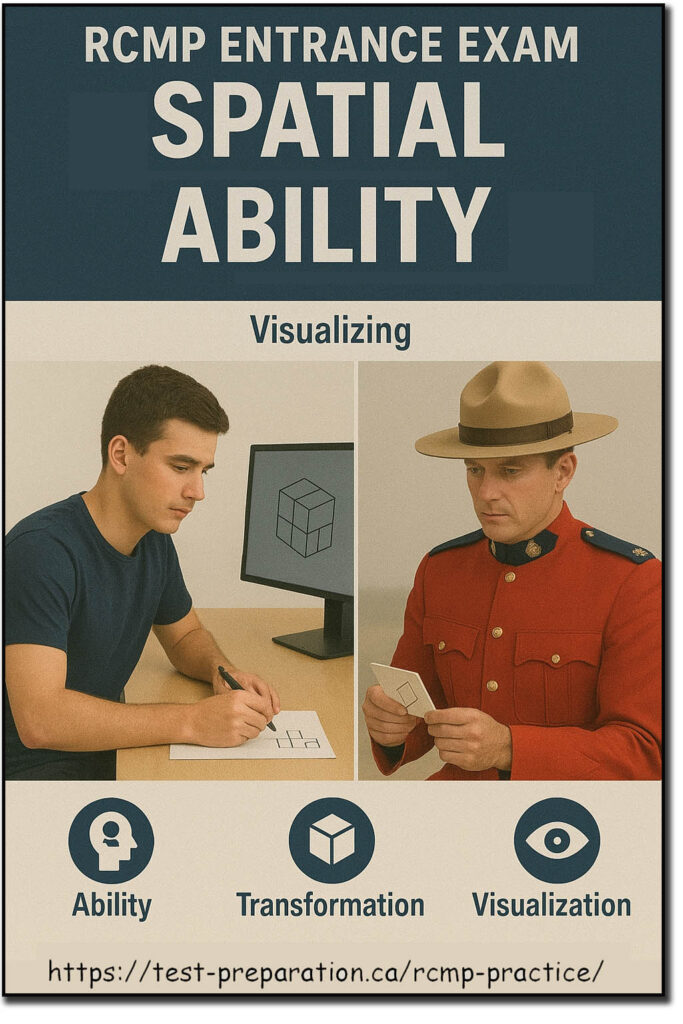
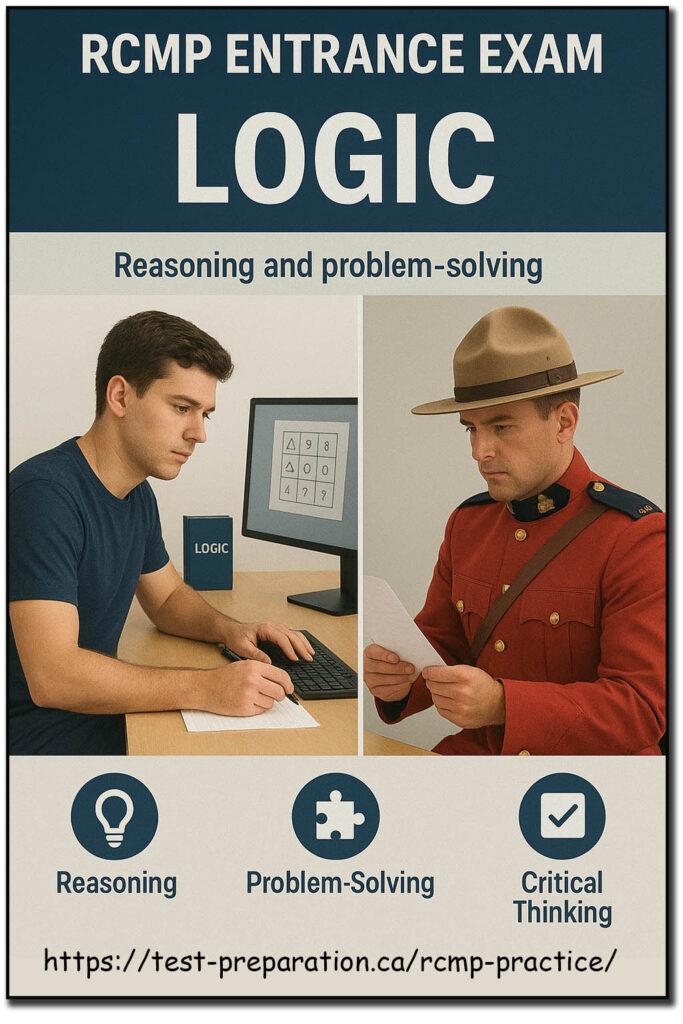
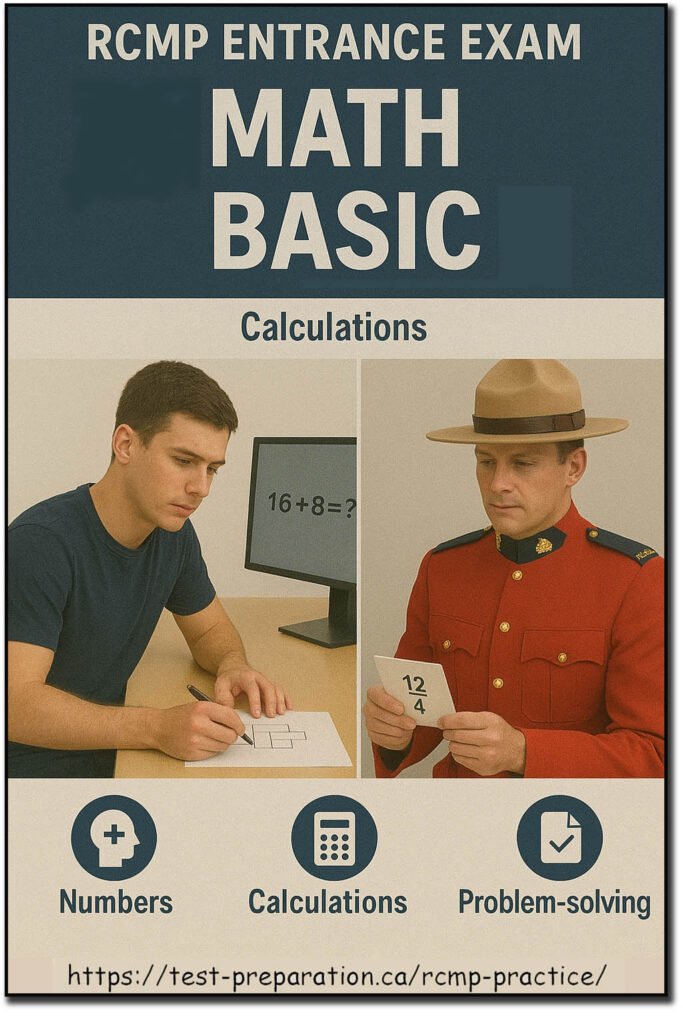
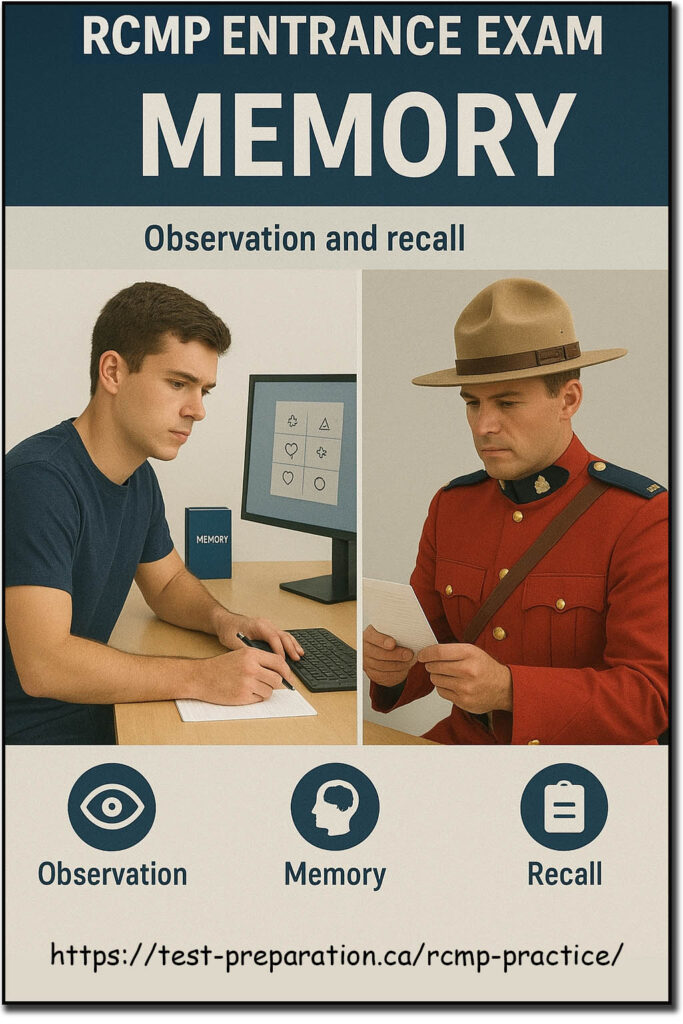
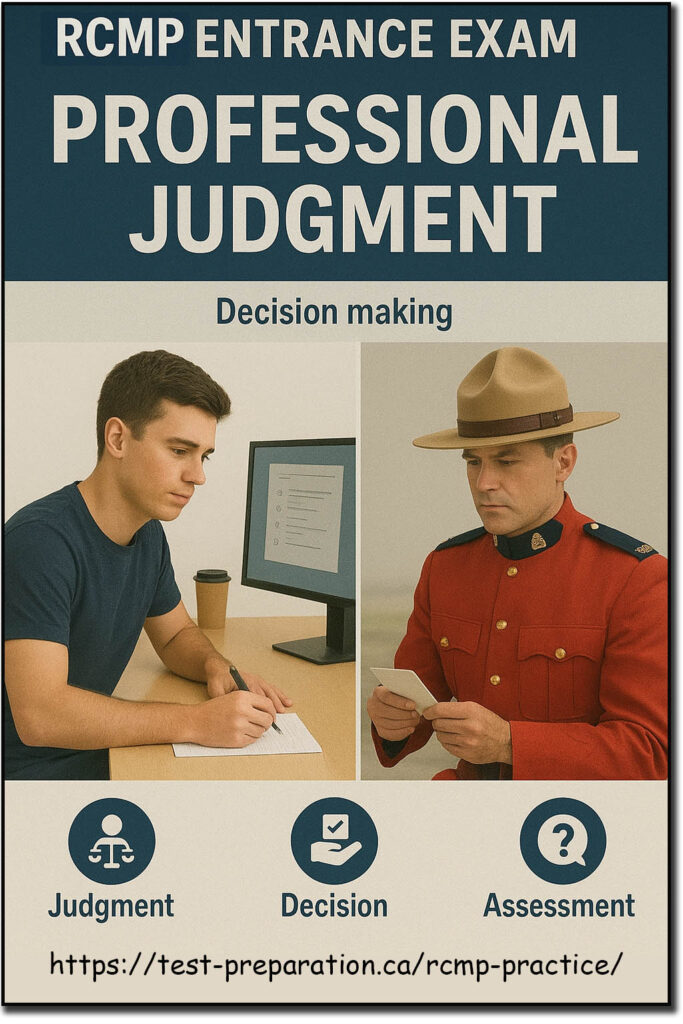
4 Comments
does this include an answer key?
Hello – yes a full step-by-step answer key is provided
How hard is the math?
thanks! Does the test of both situational judgement and police situational judgement?